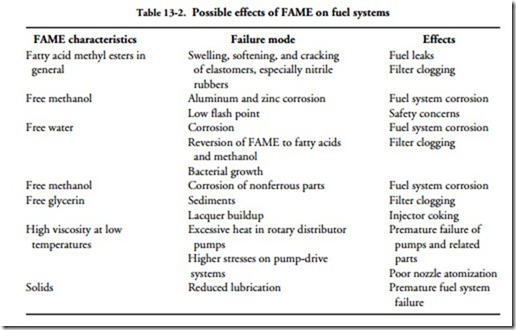U.S. and Europe
Mixtures of FAME (vegetable oils converted to fatty acid methyl esters) and conventional diesel fuel are a fact of life in Europe and the United States. B2 is widely
available in this country and provides the assurance of adequate lubrication that may be needed with low-sulfur (15 ppm) fuel. Europe is moving to a B5 standard and may adopt a B20 standard in the near future.
Renewable fuels appeal to something deep in human nature and, unlike petroleum fuels, do not contribute to global warming. Rather than collecting in the atmosphere, the CO2 released by burning vegetable products is recycled back into plant growth.
A joint statement issued by Denso, Bosch, Dephi, Siemens VDO, and Stanadyne approves the use of B5 if, the FAME content conforms to the EURO EN 14214 stan- dard and the base petroleum fuel to EURO EN590. In contrast to ASTM (The American Society for Testing Materials) standards for fuels sold in this country, EURO standards include resistance to oxidation. FAME is biodegradable, which means that it oxidizes rapidly in the presence of heat, water, and various metallic ions. By- products of oxidation include solids and highly corrosive formic and acetic acids.
Other potential problems that fuel-system makers identify with FAME are listed in Table 13-2.
Consequently, the manufacturers say they “accept no legal liability attributable to operating their produces with fuels for which their products were not designed, and no warranties or representations are made as to the possible effects of running their produces with such fuels.” In other words, American B2 users are on their own, without warranty protection.
Yet many of the same corporations produce fuel-system components used with Brazilian B2 that soon will be replaced with fuels of higher FAME percentages. According to the government, all fuel-system warranties will be honored. Brazil does not ascribe to the International Monetary Fund/World Bank model of develop- ment and, consequently, has a great deal of leverage over multinational corporations doing business in the country.
DIY FAME
Several companies market DIY transesterfication plants to convert vegetable oil into fatty acid methyl ester. There is no guarantee that the resulting FAME conforms to the ASTM D6751 standard for the commercial product, but the critical parameter— vicosity—is reduced and most solids and water are eliminated. By using waste cooking oil as the feedstock, the cost of the fuel comes out to less than $1 a gallon. Restaurants usually give the oil away, since they would otherwise must pay to have it removed. Nor is there any shortage of the product: according to one estimate, three billion gallons of cooking oil are discarded every year in the United States.
Extreme Biodiesel, based in Orange, California, markets the Eliminator, consisting of two large plastic tanks, pumps, filters, and associated plumbing. The apparatus can be set up in a garage and will, its makers say, produce 100 gal of diesel fuel in 12 hours.
The process begins with pumping the oil through a primary stage of filtration to remove large solids. This is followed by titration, a simple chemical test to determine the amount of methanol and caustic required for conversion. The user then mixes the chemicals with the oil, which is heated to speed the process. Several hours later, glycerin, the by-product of transesterfication, drops out.
Impurities that remain are removed by water spray, passed through a water separator and a 15 j.Lm filter. An alternative to the water spray is to treat the fuel with Magnesol, a decontaminate widely used in the food processing industry. At this point, the FAME is ready to be mixed with conventional diesel fuel.

